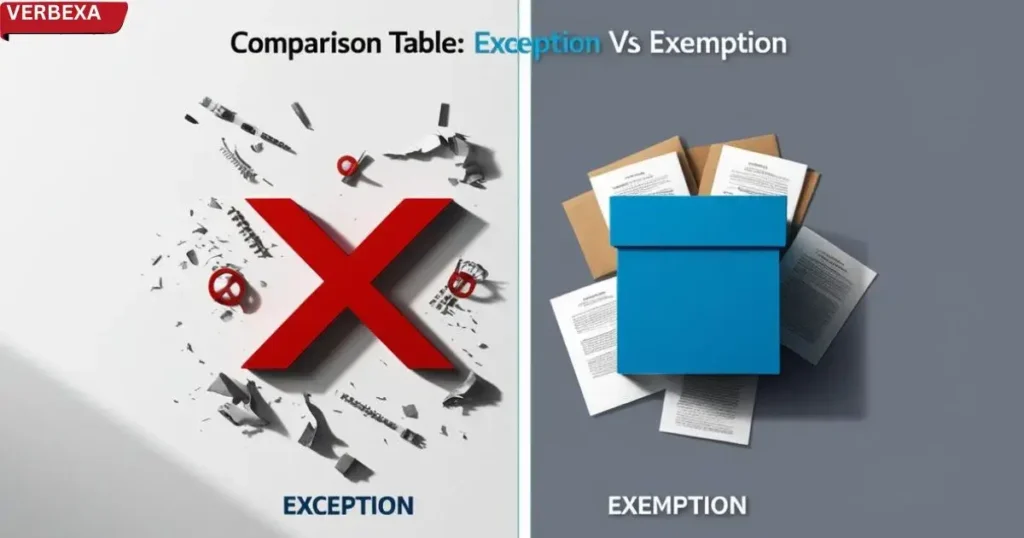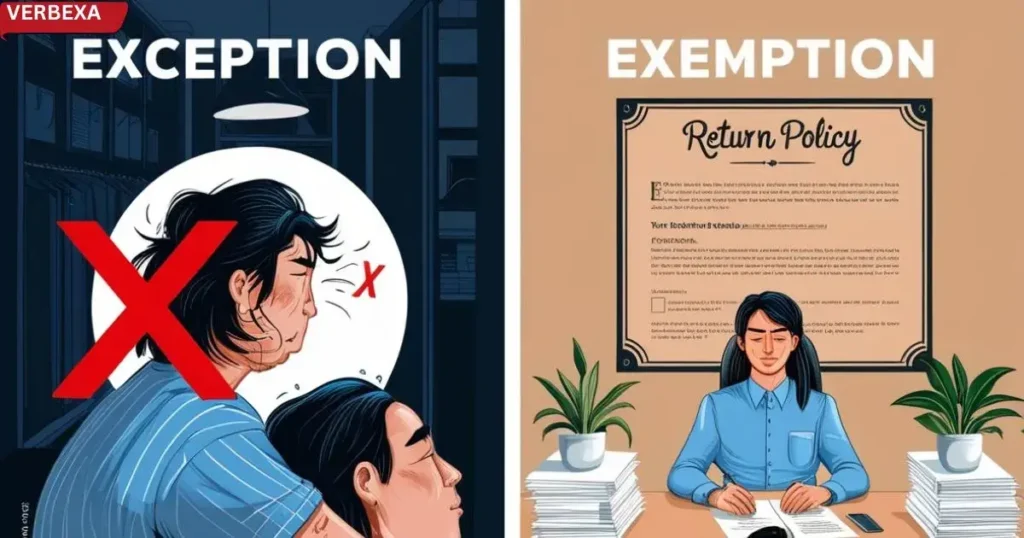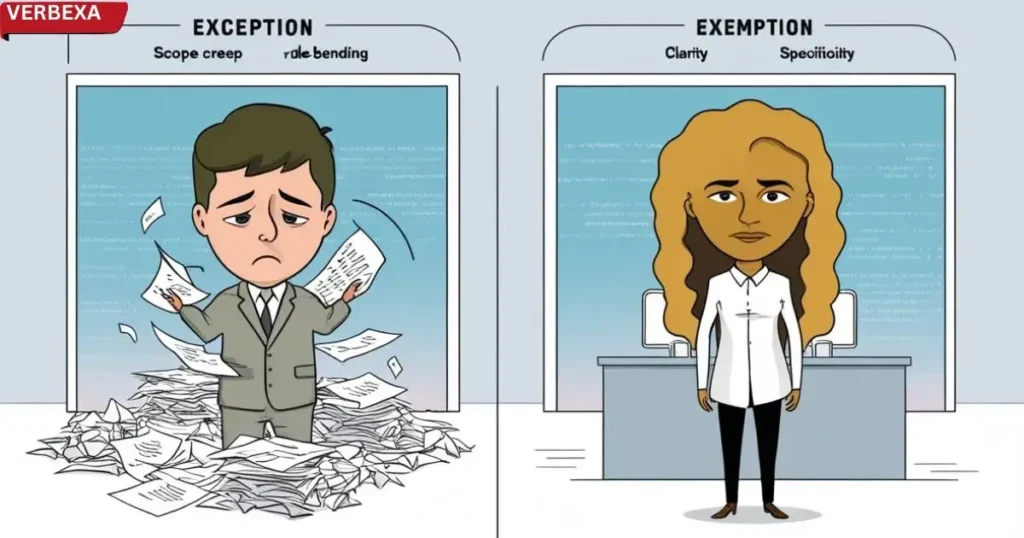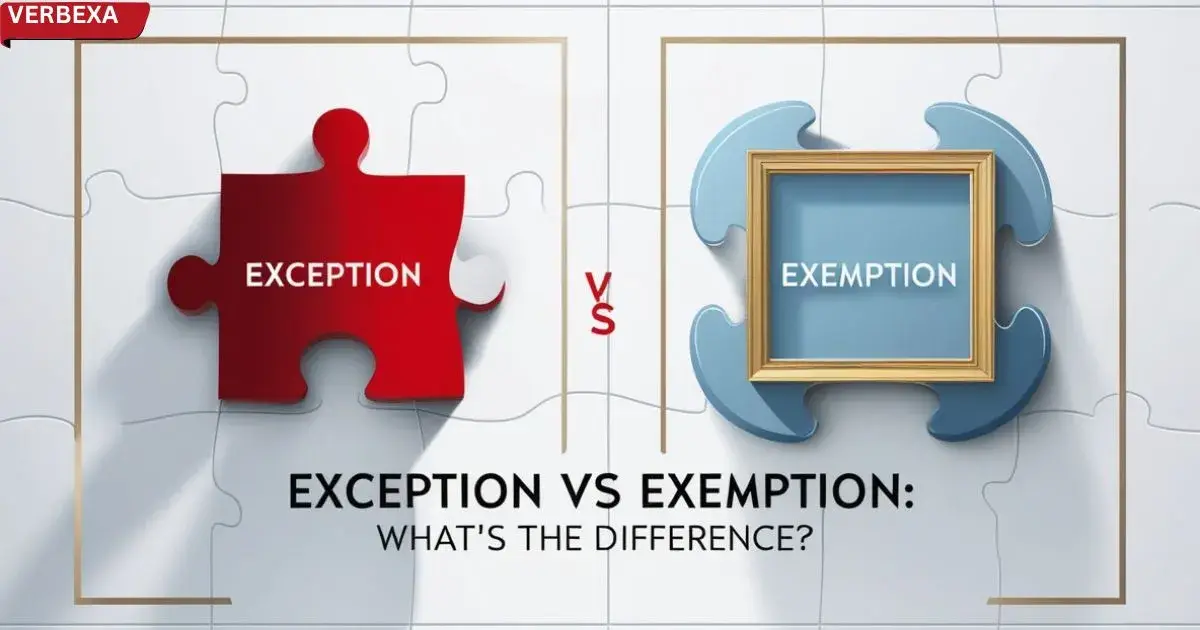The terms “exception” and “exemption” are frequently misused because they share a semantic field; both relate to deviations from rules or norms. However, their core meanings diverge significantly. The confusion stems from the subtle differences in their application and the contexts in which they appear.
Mastering the distinction between exception vs exemption is essential for precise and effective communication, both in writing and speaking. Using the wrong term can lead to misunderstandings and even legal complications. This article aims to clarify this often-blurred line, providing clear definitions, examples, and practical guidance on when to use each term. We’ll delve into the nuances of exception and exemption, leaving no room for doubt.
Definitions and Usage: Exception Vs Exemption
What is an Exception?

An exception fundamentally represents a deviation from a general rule or pattern. It highlights an individual case that does not conform to the standard expectation. When we use the term exception, we’re acknowledging that something stands apart from the typical norm.
Examples of Exception:
- Sarah is an exception to the company’s dress code policy.
- The museum’s free entry on weekends is an exception to its regular pricing.
What is an Exemption?
An exemption, conversely, indicates official permission to be released from a specific requirement or obligation. It’s a formal relief from a duty granted under particular circumstances.
Examples of Exemption:
- Veterans receive a tax exemption for certain income sources.
- Some charitable organizations are granted exemptions from standard tax regulations.
Comparison Table: Exception Vs Exemption

Let’s summarize the differences in a clear comparison table:
| Feature | Exception | Exemption |
|---|---|---|
| Definition | Deviation from a rule or norm in a specific case | Release or freedom from an obligation, duty, or liability |
| Grammatical Role | Noun, Adjective | Noun |
| Nature | Singular instance, temporary | Formal dispensation, often permanent or long-term |
| Scope | Limited to a specific circumstance | Broader, encompassing a whole category or individual |
| Context | Everyday situations, specific events | Legal, administrative, or policy contexts |
When to Use Each Term: Exception Vs Exemption, exemption vs exception
Choosing between “exception” and “exemption” depends heavily on the context. Use “exception” when referring to a single instance or a limited number of instances that deviate from a general rule. Use “exemption” when referring to a complete or partial release from a responsibility, obligation, or requirement granted under specific conditions.
This means that choosing between exception or exemption hinges on the degree of the deviation from the rule. An exception is a deviation; an exemption is freedom from the rule itself. The key is to consider whether the subject is released from the rule completely (exemption) or just allowed to deviate in a specific instance (exception). The difference between exception vs exemption matters greatly.
Everyday Usage Examples: Exception Vs Exemption, exemption vs exception

Here are some relatable examples illustrating the use of exception and exemption:
- Exception: “Generally, we don’t allow pets in the office, but there is an exception for service animals.” This indicates a specific deviation.
- Exemption: “He was granted an exemption from the late fee because of extenuating circumstances.” This indicates a release from the fee altogether.
- Exception: “The meeting is usually held on Thursdays, but this week, Friday is the exception.” Here, a single instance deviates.
- Exemption: “Students under 18 qualify for an exemption from the gym membership fee.” Here, a whole group is released from the fee.
Consider exemption vs exception in a tax context: “There’s a tax exemption for charitable donations,” describes a complete release from tax liability on donations.
Let’s delve further into the semantic entities: Veterans might be granted a tax exemption. Employees may be given an exemption from mandatory overtime. Students might receive an exemption from certain fees. A museum might be granted a property tax exemption. The use of exception vs exemption changes the meaning entirely.
Here are additional examples using the provided semantic entities and contextual relations:
- Exemption from jury duty (due to age): “Due to her advanced age, she received an exemption from jury duty.” This is a complete release from obligation.
- Chocolate (special occasion context): “Generally, we avoid sweets; however, birthdays are an exception.” This is a specific deviation.
- Coffee (weekend exception): “I usually limit my caffeine intake, but weekends are the exception.” This is a deviation from a routine.
The choice between exception or exemption profoundly impacts meaning. The use of exception and exemption hinges on the specific situation. Choosing the right word is essential for effective communication.
Common Pitfalls in Exception vs Exemption

Misusing these terms can lead to communication breakdowns. Consider these scenarios:
- Incorrect: I have an exemption from the writing assignment. Correct: I have an exception to the writing assignment requirement.
- Incorrect: The student claimed an exception from taxes. Correct: The student claimed a tax exemption.
Real-World Applications
Professional Contexts
- Labor Law: Certain employees might receive exemptions from overtime regulations
- Tax Regulations: Exemptions for specific income categories
- Academic Settings: Exceptions for unique student circumstances
Personal Scenarios
- Jury Duty: Exemptions based on age or profession
- Travel: Exceptions to standard immigration policies
- Healthcare: Exemptions from specific medical requirements
Conclusion: Mastering the Exception Vs Exemption Distinction
While both “exception” and “exemption” relate to deviations from rules, they represent distinct concepts. An exception notes a specific instance deviating from the norm, while an exemption grants freedom from an obligation or liability. Understanding the nuances of exemption vs exception, as demonstrated by the various examples and comparisons, enables precise and effective communication, avoiding ambiguity and ensuring clarity in both written and spoken contexts.
Remember, the difference between exception vs exemption is not trivial; it’s fundamental for accurate and clear communication. Choosing between exception or exemption should be based on whether there is a complete release from an obligation or simply a deviation from a rule.
The correct usage of exception and exemption demonstrates a sophisticated command of language. Understanding the contextual implications of exemption vs exception is crucial for any writer or speaker. The difference between exception vs exemption should be clear after carefully considering all the examples provided.

This author is a passionate linguist and grammar enthusiast, dedicated to helping individuals master the art of language. With years of experience in teaching and editing, she brings clarity and precision to every sentence. Tina’s mission is to empower writers of all levels to express themselves with confidence and excellence.

